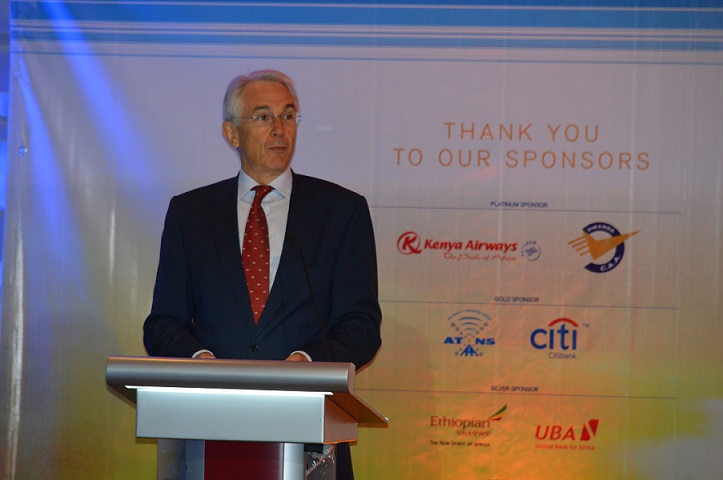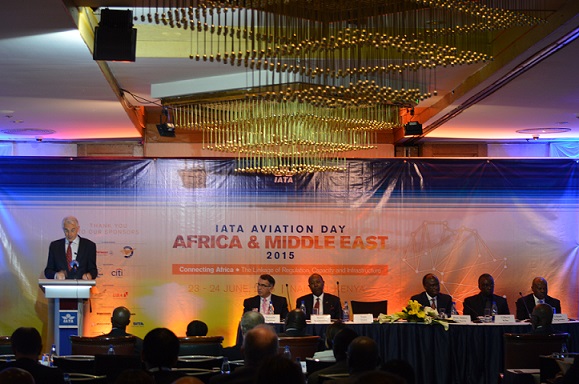Nairobi – The International Air Transport Association (IATA) called for governments, safety regulators and industry to take action to drive aviation connectivity and infrastructure development in Africa for the economic and social development of the continent.
“Africa is set to be one of the fastest-growing aviation regions over the next 20 years, with annual expansion averaging nearly 5%. This opens up incredible economic opportunities for Africa. But aviation faces considerable challenges, and for its potential to be realized, correct policies must be developed. Smarter regulation, and a focus on delivering the safety and connectivity commitments of the African Union, will be crucial to establishing Africa as a global aviation powerhouse,” said Tony Tyler, IATA’s Director General and CEO.
Tyler made his remarks at the IATA Africa and Middle East Aviation Day in Nairobi, Kenya. The event is bringing together key stakeholders under the theme ‘Connecting Africa’ focusing on the development of frameworks to promote connectivity in regulations, commerce, and operations.
In his speech, Tyler identified key challenges needing to be addressed:
- Safety – “Safety must always be our first priority. Africa experienced zero jet hull losses in 2014, an excellent result. The all-aircraft accident rate, however, remains considerably higher than the global average. The Abuja Declaration commitments by African governments must be followed up with action to increase compliance with ICAO standards.” IATA is moving forward with assistance for airlines that are eligible for the IATA Operational Safety Audit (IOSA). For airlines ineligible for IOSA, a new IATA Standard Safety Assessment (ISSA) has been developed.
- Smarter Regulation – “African nations have an opportunity to enact smarter regulation to enable better aviation connectivity. Implementation of the Yamoussoukro Decision will open up air routes within the continent and provide opportunities for more than 5 million additional passengers a year. Those African governments yet to ratify the Montreal Convention 99 and Montreal Protocol 14 treaties, on global standard airline liability and the treatment of unruly passengers respectively, should do so without delay.”
- Infrastructure –The provision of appropriate infrastructure, offering the right capacity at the right price, is essential for the growth of sustainable air services across Africa. “The International Civil Aviation Organization (ICAO) has very clear guidelines on infrastructure funding—and Africa has an opportunity to be a leader in this field by developing its infrastructure in close consultation with the industry.”
- Environment – “The industry is committed to meeting its carbon emissions targets. In particular, our goal of carbon-neutral growth from 2020 is of utmost priority. The negotiations for a global market-based measure to tackle carbon emissions from aircraft are entering a crucial phase ahead of the 2016 ICAO Assembly. It is vital that African governments support a workable solution, in order for a measure to be in place in time for the industry’s 2020 goal of carbon-neutral growth.”
The opening session of the Aviation Day featured participation from senior government and industry leaders including James Macharia, the Cabinet Secretary for Transport; John Kipngetich Mosonik, Kenya’s Permanent Secretary for Infrastructure & Transport; Dzifa Attivor, the Minister of Transport for Ghana; Barry Kashambo, Regional Director Eastern and Southern Africa, ICAO; Elijah Chingosho, Secretary General of AFRAA; and Gilbert Kibe, Director General of the Kenya Civil Aviation Authority.
For more information, please contact:
Corporate Communications
Tel: +41 22 770 2967
Email: corpcomms@iata.org
Notes for Editors:
- IATA (International Air Transport Association) represents some 260 airlines comprising 83% of global air traffic. www.iata.org
- You can follow us at http://twitter.com/iata2press for news specially catered for the media.
 |
 |
